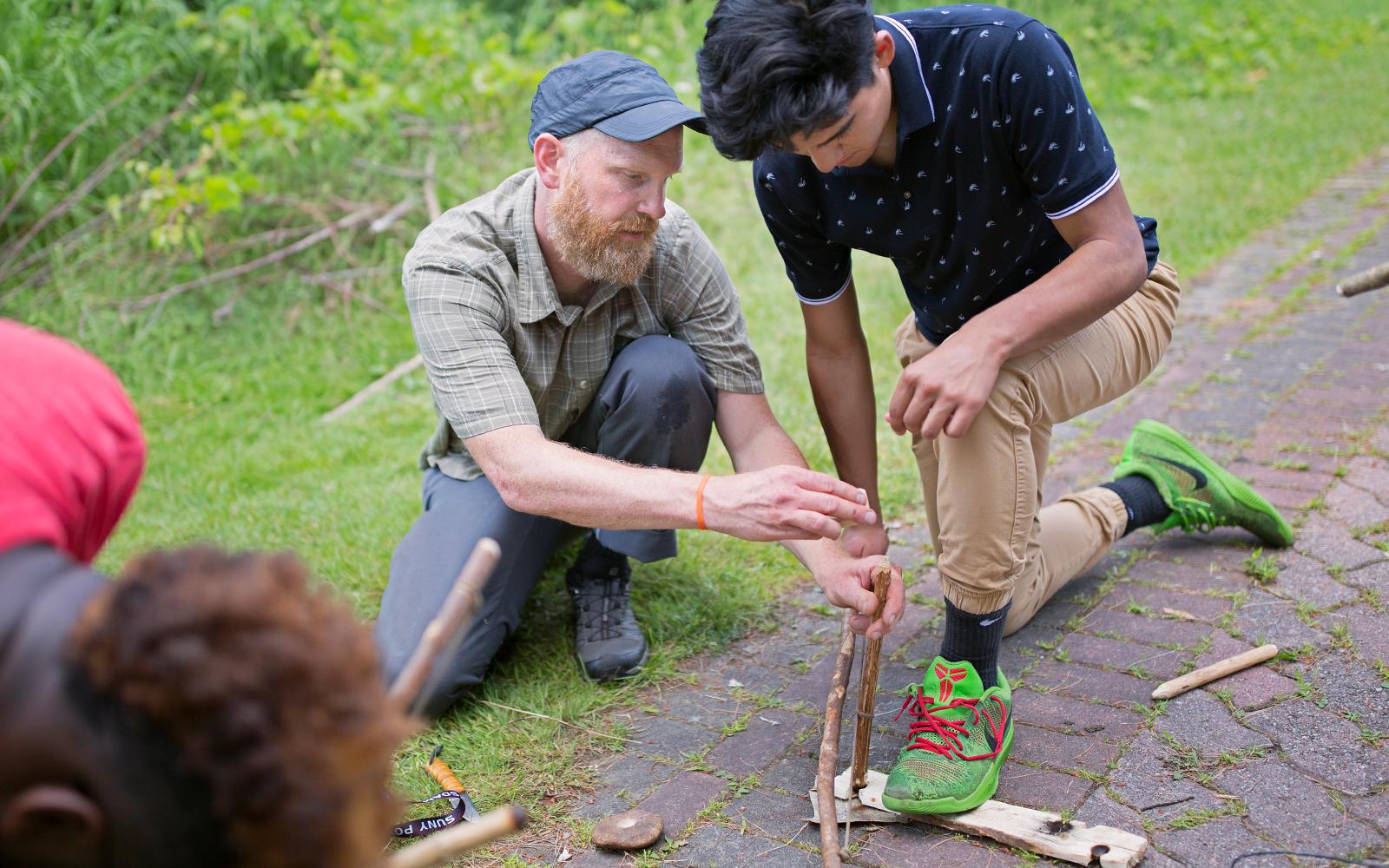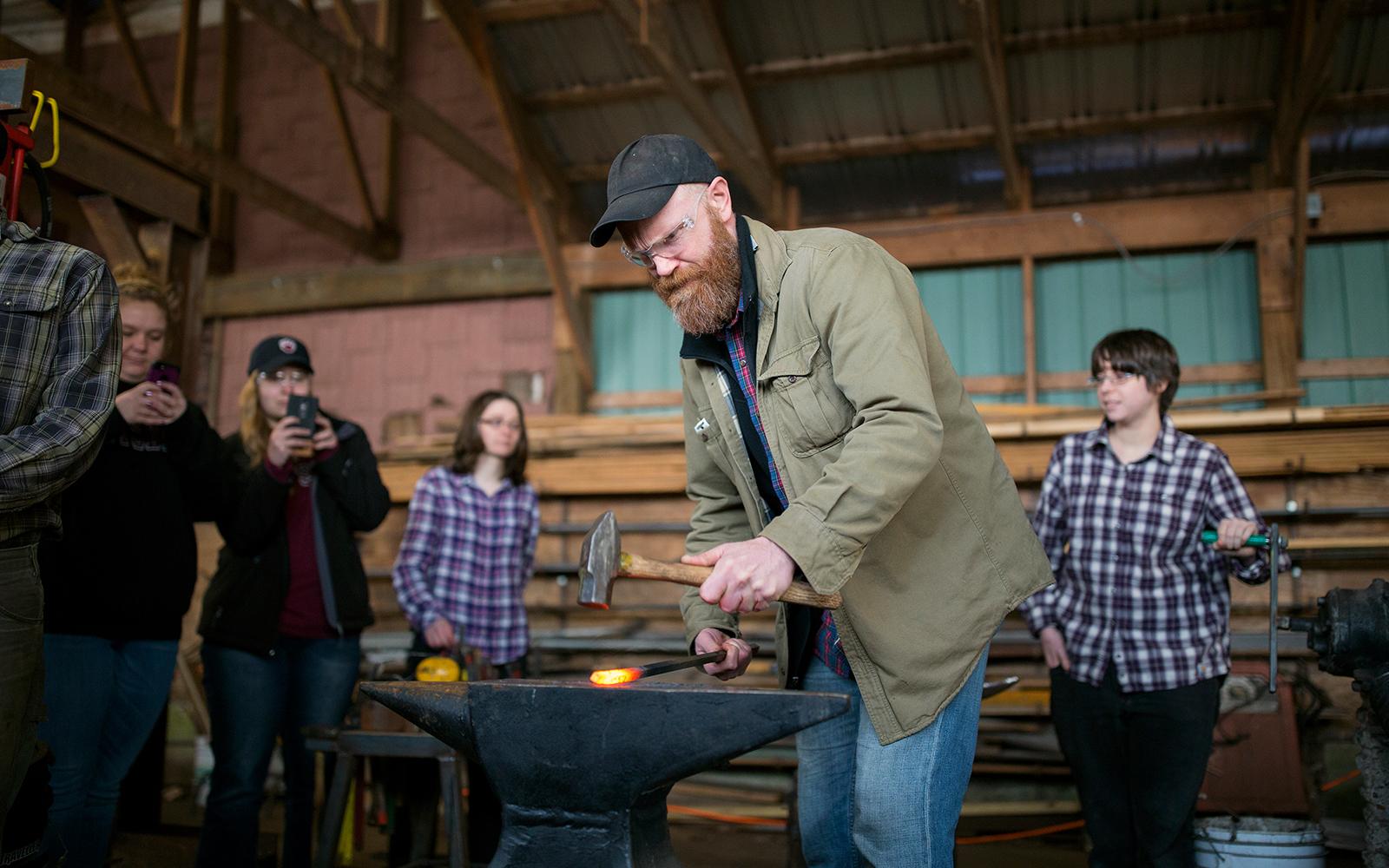Students seeking hands-on, applied learning opportunities need to look no further than Dr. Timothy Messner’s experimental anthropology class. The new course was conceived after the success of his four-week summer class, where students built a canoe out of a 16-foot white pine log using Stone Age, handmade tools in the summer of 2015. The class garnered media attention after they successfully paddled the primitive canoe around the Raquette River in Potsdam at the conclusion of the class.
For the first time, an Adirondack-themed experimental archeology class is being offered in a semester long format. Messner said that students, “critically explore the Adirondacks and how people may have been using it in the ancient past. Part of the nostalgia and mystique of the Adirondacks is that it was basically a big starving ground. There was nothing to eat there and so native peoples were forced to chew on trees, which if you look at the term Adirondack, it’s a Mohawk word that actually means bark eater or they eat trees.”
One of the highlights of the class will be an Adirondack bark pancake breakfast in May. Students will make pancakes with wheat flour, supplemented with white pine bark flour and birch flour during a special breakfast at Traditional Arts in Upstate New York (TAUNY) in Canton. They will also be tapping maple trees on Pierrepont Ave., boiling the sap and making maple syrup on campus. Messner explains that “if you look cross culturally around the world, people in northern latitudes have long traditions of using the inner bark from birch and white pine trees to make bread.”

Brookelin McKay, a junior majoring in Archaeological Studies and Anthropology, took a break from sorting through artifacts in the archeology lab to discuss her experimental anthropology course. “I love it! It allows me to work with my hands. For example, right now we’re tapping trees out on Pierrepont. It’s way more hands-on than any of my other classes have ever been and it helps me learn in a really unique way.”
“I think his teaching approach is really wonderful. He’s really involved with his students. I feel comfortable going into his office while I’m doing this (sorting through artifacts) and saying, ‘I don’t know what this is, can you help me.’”
Messner received his doctorate from Temple University in 2008 and won the dissertation of the year award from the Society for American Archeology in 2009. He did his post-doctoral work at the Smithsonian and he was an adjunct professor at the University of Wisconsin-Stevens Point before accepting a position at SUNY Potsdam five years ago.
SUNY Potsdam was ultimately a great fit for Messner. “My research area of interest and expertise is the northeast. Here we have, what I would, and actually many would call, one of the best archeological programs in the northeast, situated in an area that has a rich pre-history and one that’s really untapped.”
His technique for engaging students in his upper division classes is to utilize as much applied learning as possible. “We teach students to do archeology and we prepare them in the classroom, but ultimately the real knowledge, the real instruction happens in the field.”
That manifests itself most clearly in SUNY Potsdam’s four-week field school offered every summer through the anthropology department. Last summer he led a group of students to Tupper Lake where they excavated a 7,000-year-old native American site. “Every morning we got up and had to canoe across the lake to the site and students learned to do archeology by doing archeology. Not only that, but they’re helping to produce knowledge about a region that’s really poorly understood.”
Because of its popularity, last year students lined up at 4 a.m. to sign up for the field school. He said they can take the field school anywhere, but “they’re encouraged to take it through us. It allows us to get to know them in the field, which is a completely different animal from the classroom, having to put up with mosquitos, poison ivy, heat and each other in those conditions.”
Additionally, he started an atlatl competition in conjunction with St. Lawrence University. The atlatl, or spear-thrower, is used to launch darts at a target, much like at an archery range. SUNY Potsdam students were able to experience Messner’s hands-on educational approach as they created the handmade, ancient dart-throwing tools to be used in competition, last fall hosting Paul Smith’s College for the third iteration of the event.
To track the activities of the experimental anthropology class, visit the Anthropology Facebook page.

